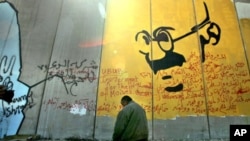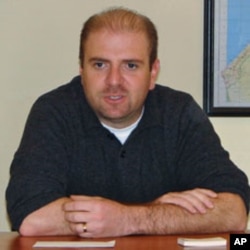Today's explosion in Jerusalem and the exchange of fire over the Israeli-Gaza border has increased tensions between Israelis and Palestinians in recent days.
All of this comes ahead of a planned "million-man march" being organized via Facebook which coincides with the commemoration of Land Day. On March 30, 1976, clashes erupted between Arabs and Israeli security forces over disputed land.
Organizers plan to unite Muslim and Christian Palestinians to break Israeli restrictions and pray in the Al-Aqsa Mosque and Church of the Resurrection.
Other commemorations are planned for that day, but one organization, the Holy Land Trust, plans to organize a special non-violent protest to mark the anniversary.
Sami Awad is the Executive Director of Holy Land Trust in Bethlehem. He spoke by phone with VOA's David Byrd.
Byrd: March 30 is referred to as “Land Day,” a day commemorating a day in 1976 when there were clashes between Arabs, Palestinians and Israeli Security forces. Your organization Holy Land Trust is primarily a non-violent protest organization. What do you plan for March 30?
Awad: Yes, you are right. As an organization we are fully committed to non-violence. What we do is we do training and workshops and encourage the Palestinians to resist the occupation through non-violence. And on March 30 what we are planning to do is a major tree-planting campaign in areas where settlements are being expanded. Especially where our organization is in the Bethlehem area, settlement activity over the last two years has been tremendous. And lots of land has been confiscated and lots of trees - fruit trees, olive trees - have been uprooted by the expansion of these settlements and the building of the Separation Wall.
So we are encouraging and we are organizing Palestinians, joined with internationals and also Israeli peace activists to join us on this day and plant trees as a sign of protests but also as a sign of steadfastness for these farmers to say that they will remain steadfast on their land.
Byrd: Just today there are reports of an explosion at a downtown bus station in Jerusalem. Your organization is committed to non-violence. Do incidents like this hurt the overall Palestinian cause, is it a militant faction expressing itself or is it more like one individual wanting to carry out their frustrations?
Awad: Yes, well, the incident is so fresh, we have no information yet as to the source of this very - I would say very painful and sorrowful attack that happened, or this explosion. As an organization we always say we are committed to non violence. We don’t condone, we don’t accept, we don’t encourage the use of any form of violence by Palestinians to end the occupation.
We take this not just from an ethical, holistic point of view but from a pragmatic, and a strategic point of view we feel that the biggest weapon we have and the most powerful force we have is in the force of the people and not in the force of weapons. So we strongly condemn acts of violence that hurt individuals. Of course, as Palestinians we condemn it on the Palestinian side, but we condemn all acts of violence as well and they should not happen.
For us, when we engage in non-violence, it is not just about achieving a political solution. It’s not just about reaching a political agreement, or a cease-fire of violence. For us non-violence is much greater. So for us, any act of violence, even goes further than making a political statement: it goes into the core issues of Jews living in fear, how security has become a big issue, and by Palestinians engaging in non-violence we are able to begin to break down those barriers in order for us to break down the concrete and cement barriers that exist around our towns and villages.





